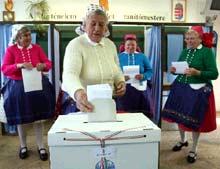| Home / International / International -- World | Tools: Save | Print | E-mail | Most Read |
| Close Result Expected in Hungary |
| Adjust font size: |
Polling stations opened at 04:00 GMT and some 8.1 million voters were eligible to cast ballots. The National Election Office said it expected to announce results about three hours after voting ends at 17:00 GMT. By 11:00 GMT, voter turnout was 48.9 percent, 3 percentage points lower than at the same hour in the previous parliamentary election, in 2002. Experts predicted that many of the legislature's 386 seats would be decided in Sunday's first round. Runoffs will be held on April 23 in districts where no party's candidate wins a majority. A ban on publishing poll results went into effect on April 1, but the last surveys released showed the Socialists building a slight lead over the center-right Fidesz-Hungarian Civic Union. Prime Minister Ferenc Gyurcsany and opposition leader Viktor Orban both are trying to become the first Hungarian premier to serve a second term since the country adopted multi-party elections in 1989. Gyurcsany was chosen by lawmakers in September 2004 following a coalition coup that ousted Prime Minister Peter Medgyessy midway through his four-year term. Orban was prime minister from 1998 to 2002. Some voters seemed to be responding to a Saturday speech by President Laszlo Solyom, who urged voters to play a role in deciding the country's future. "Now we can decide whether this cycle is going to continue or if something new may happen," said Gyula Szeker, 46, after casting his vote accompanied by his 10-year-old son, Zsigmond. Others hoped for more accountability from politicians. "We would welcome politicians in this country taking responsibility for their statements," said Istvan Hargittai, 64, a university professor. Urgent economic reforms needed to adopt the euro the EU's currency unemployment and the modernization of the health and education sectors are some Hungary's most pressing issues. Despite four years of excessive government spending the budget gap this year is expected to be nearly triple the EU limit of 3 percent of gross domestic product Gyurcsany has vowed to ready Hungary's economy to adopt the euro in 2010. Analysts say 2012-2013 seems a more realistic date even if reforms are launched quickly by the next government. (China Daily April 10, 2006)
|
| Tools: Save | Print | E-mail | Most Read |
 |
| Related Stories |
|
